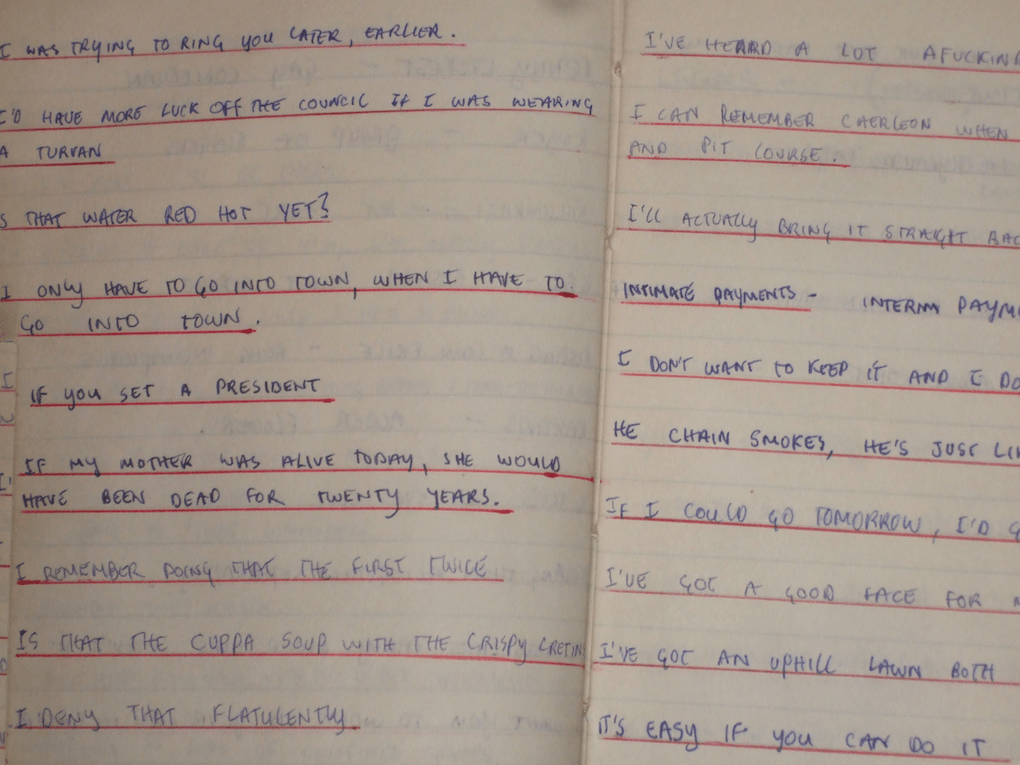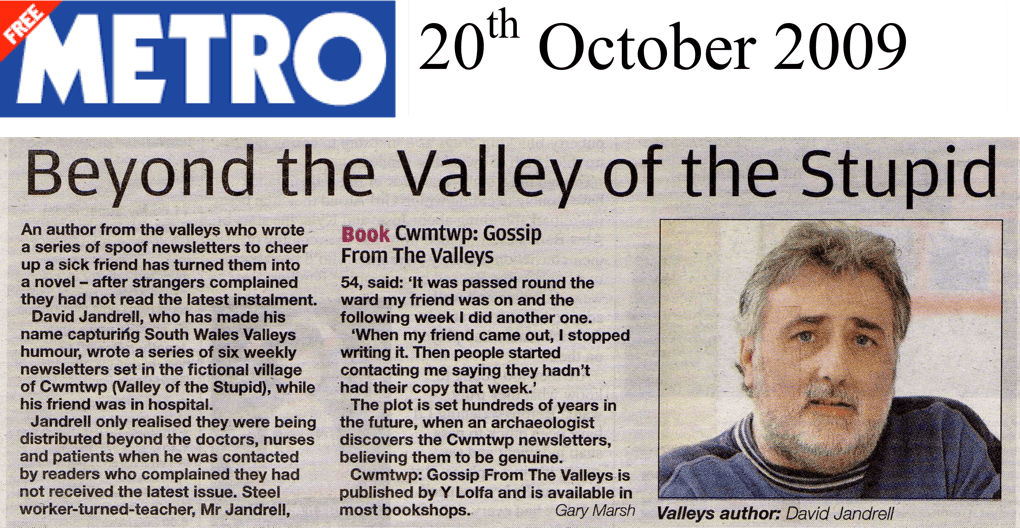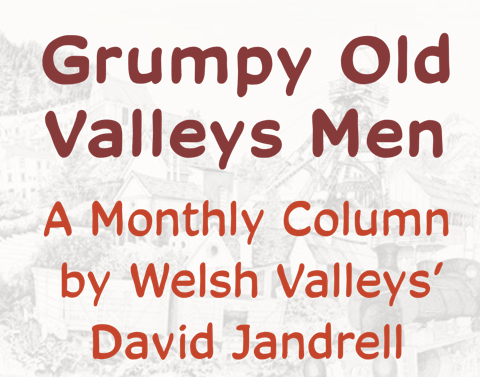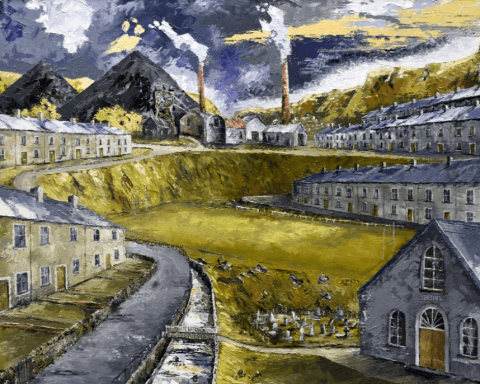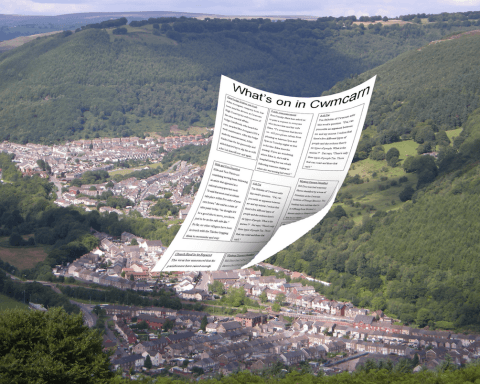Here in an irregular column, top-selling Welsh Valleys Humour author will share his experiences of writing and his experiences of the craft… take a seat in a comfortable chair with a lovely cup of tea and enjoy his wisdom and humour!
Table of Contents
January 2019: How I (Almost) Became a Scriptwriter
I have referred to most of the people mentioned in this piece by their titles and positions that they held at the time that the events took place rather than using their names. They have all ‘moved on’ long since and I have no way of contacting them to ask their permission to publish their names here.
How I began writing scripts is a bit of a mystery to me, still. If that sounds daft, it may make more sense later on.
It would have been late 1990s when an acquaintance told me that he had a lot of ‘clout’ at the Beeb and he’d heard something while visiting them one day ……. straightaway my name came into his mind. According to him, the Beeb wanted to produce a Welsh sitcom and they couldn’t find anyone able to write it. This was not strictly true as Satellite City had just come off the air so there were people who were able to write it. Although his story, so far, wasn’t making perfect sense I let him continue.
Apparently, they wanted a different kind of sitcom – not the standard show where the characters remained the same throughout the series- such as Terry and June, Not Going Out, Only Fools and Horse etc. They wanted a series of six different episodes with different storylines for each, but the actors would be constant throughout all six episodes. This to me sounded like the ‘Ripping Yarns’ series which all featured Michael Palin with regular appearances from other Pythons, mainly Terry Jones.
My acquaintance informed me that I should knuckle down and write these six stories post haste as time was short – we couldn’t afford to miss the submission date, which was looming.
I reeled him back in for a moment to clarify a few points. Firstly, the way in which he used the term ‘we.’ Were ‘we’ an item? When did we become ‘we’ and what was the purpose of our amalgamation, if that’s what it was?
Secondly, why had I been chosen to write these scripts – at the time I had not written anything that was worthwhile showing other people – well maybe contributed to a couple of best man speeches, but nothing as ambitious as penning something that was to be submitted to anyone, especially to the BBC!
His reply: he was going to be my mentor. He’d steer me through the process, sort out all the paperwork and negotiations, you know, the technical stuff and that would mean that I didn’t have to bother with any of that and it would free me up to just concentrate on the writing. As far as the reason why I was the chosen one; it was because: ‘You’re a really funny guy, great sense of humour, mental, and I know you can do it.’
Mental?
So, like the good boy that I am, I set about writing six scripts along the lines that he had suggested. Because Ripping Yarns had come into my mind, I thought of two people who I could base my stories around – and being a Welsh sitcom, I thought of Owen Money and Max Boyce. These two people ‘played’ the roles of the characters in each of the six episodes. Whilst they were in my head for the writing process, they weren’t written ‘for’ them, they were just the benchmark that I used to build the characters around.
When complete I passed them on to him and waited. About a fortnight later, through him, I got the most fantastic feedback from the Beeb. They loved them and it wouldn’t be long before they got in touch.
A few months of nobody getting in touch passed so I decided to get in touch with the Beeb direct, as my mentor seemed to have just faded away.
I printed off a copy of one of the scripts and posted them to; Drama Dept. BBC, Llandaff, Cardiff in an envelope (no internet in those days). I added a covering letter reminding them of the scripts that they had ‘loved’ and also mentioned my mentor to add clout to my reminder.
A few weeks later, I received a letter from the Head of Drama at BBC Wales who wrote: ‘Nobody at BBC Wales Drama has had any sight of any of the scripts that I had mentioned in my letter. He did not know who had provided the feedback- it certainly wasn’t anyone at the BBC. Strangely, my mentor was not known to anyone who worked at BBC Wales and I must have got my lines crossed somewhere.’
That was very worrying ……….until …..
The second paragraph of his letter; ‘Regarding the one script that you have sent and which I have read, I would like to talk to you about it. Please make an appointment to come to Llandaff so that we can meet up.
On the day, I was given a pass and someone took me off to his room.
He was very nice and put me at ease right away. We had some coffee and then we got down to business. He slapped my script on the table and began:
“This is very unusual. Firstly, it is by far the worst script that has ever been submitted to me, and believe me I been given some crap over the years. This is streets ahead of anything I’ve seen before, as far as being bad is concerned. It’s awful. But don’t let that put you off. It is awful because of the way that it is presented. On the positive side, it contains the best dialogue I’ve ever seen written on paper. It is remarkable. I read this originally on the train coming back from London and normally with unsolicited submissions they go straight in the bin. You know, there are only three or possibly four storylines in drama and you can tell after the first page where these scripts are going. But this! Had me guessing right the way through. I got to the end of a page and I was compelled to turn over because I just had to see was what going to happen. That rarely happens you know. I read it again yesterday because I knew you were coming to see me and there were things that I had missed the first time. It really is very very good. Everything I need is there. The only thing is, you can’t submit this to me like this because of the format. Have you ever written scripts before?”
“No.”
“Have you ever seen a script.”
“No.”
“Right. We have some work to do then. You are going to submit this to me again, but the next time it will be in the correct format. I’ll show you how to do it.”
“Great …. er …. when?”
“Now. You can stay here until I’ve gone through it with you and you can take it away, do the changes and re-submit.”
The, he went though every line, ripped it apart, laughed, frowned, crossed out complete sentences. He marked it in the same way that I used to mark my students’ work.
He had one of these pens that had multiple ink chambers that he could change colours with a twist of the top. He used three colours, red, green and blue. Each colour indicated a different task that I had to perform on that chunk of coloured text when I got it home.
When the session came to an end, I got ready to leave. He gathered up my script, put it tidy and stapled it back together again for me. He offered it to me and then snatched it back and asked, “Actually, can I keep this?”
I asked him why, he said, “Because when you have your first blockbuster I can come back for you and ask you how much you’ll give me for this.”
I told him he could keep it and left the BBC ready to catch my first of three buses home.
When I got home, I got the script up on my PC screen, highlighted the whole thing and altered the margins and doubled space the text. That took all of 18 seconds.
I intended to make the changes that had been suggested and remembered that I’d left the ‘answer sheet’ at the BBC. What a donut!
I couldn’t remember a thing that he had said so I closed the file, saved the changes and left it lurking somewhere on my hard disc.
I decided I’d ask him if he would send me the script so that I could make the changes and promise to send it back to him.
Things like that take a long time with me, and, before I had the chance to do that I got an unexpected call from someone from HTV at Culverhouse Cross.
I guessed that he was the Head of Drama at HTV.
He was a very blasé character, laid back and sounded a bit like an old hippy on the telephone.
He told me that he was aware that I was a scriptwriter (wow, my status had now become ‘scriptwriter’). One of his colleagues had recently changed jobs and had moved to HTV from BBC and had had sight of the script that I had given to the Head of Drama at the BBC. He had recommended it to those at HTV and suggested that he gave me a call as he was aware that I had written more than one. He asked me to post him an example of my work.
I sent him another from the original six and before I knew it I was standing at reception at HTV asking for their Head of Drama!
He said he loved the script and would definitely do something with it. He asked me how many more I had. I told him I had four others – I told him that the one that I had given to the BBC was not available to him as a matter of courtesy
I apologised for the state of the formatting. I told him that the BBC had a huge problem with my presentation and I had not had the chance to tart up the script I’d sent to him before I sent it.
He was much more laid back about it and said; “Don’t worry about that. I don’t bother with all that nonsense. Everything I need is within the text. Leave it as it is.”
He told me to leave it with him and he’d be in touch soon.
A few days after my trip to HTV, I suffered a major hard disc failure on my PC and lost everything that was on it. I had no option but to buy a new hard disc as the computer was unusable. I gave the failed disc to the IT department in the college that I worked at and asked them if there was any way that they could retrieve the data that was on it. They doubted it but said they’d try after I’d offered them copious quantities of cash as a bit of a motivator.
Two weeks went by with no luck. And Sod’s Law ……….. I had a call from the Head of Drama at HTV to tell me that he’d lost the script – could I print him off another one?
I explained that I had lost all my work – there was only one hard copy in existence, and that was the one that he had lost!
He asked me if I could rewrite it, and quickly, he had to take it to a meeting and there was not a lot of time.
Apart from the attention that I was paying to it when I was writing it, I had never read the whole thing – not even proofread!
I had a go and turned version II round very quickly, three or four days I think. I posted it to him at HTV.
Two days after posting, a very smug IT expert came up to me in the staff room and told me that they had repaired the disc and as far as he could tell, nothing had been lost. He very kindly came to my house and reinstalled the disc into my PC – and there they were, all intact!
I compared the original with version II and I had got it very wrong. I didn’t even get the names, or sex, of the main characters right. It was nothing like the original. I thought I’d better ring him to warn him about the differences.
He informed me that not only had he read version II, he had found the original (but had neglected to tell me) and wondered why I’d sent him a different story. I told him that my writing style was very indisciplined and that was the best I could do in trying to reproduce a story from memory that I had not actually visited since the day I penned it.
To complicate matters further, he told me that version II was just as good and he couldn’t decide which he liked the best. He asked me to merge the two and send him a version III which contained the good bits from both versions I and II.
I pondered this for a few days and then decided to ask him which were the ‘best bits’ in his view and I could work with those. I rang HTV and the person I spoke to told me that he had gone on ‘walkabout’ again and they couldn’t contact him.
I enquired, “Walkabout again?”
The answer; “Oh he does this all the time. He just disappears. Doesn’t tell anyone where he is. The last time he did this he was gone for over a year and then suddenly, right out of the blue he turned up without so much as a by your leave – just like as if he hadn’t been away.”
So that was that. I decided to get back in touch with the Head of Drama at the BBC as a few months had gone by since I last spoke to him. And…… sod’s law …… he had moved on to bigger things. He’d left BBC Wales for National TV to do ‘Casualty.’ Well you can’t blame him really.
I was put through to the new Head of Drama and she told me that she had had sight of the script that I had given to her predecessor, but he had taken it with him. It was one of the things that he had mentioned to her during the hand-over period. She had read a photocopied version and at the time she didn’t think it was ‘her bag’ but she’d re-read it, show it to some of her colleagues and get back to me.
I did not ask her to send me the photocopy as it would have lost the original’s colour coding so, although I knew there was a need to revamp it, the photocopy wouldn’t help.
Just in case the Beeb’s interest was roused, I was concerned that I may need to format them correct pretty sharpish so I burnt all the scripts onto a CD and gave it to the drama department in College and told them that I needed to put them into an acceptable format. Could they help? They said it was easy – and gave me a copy of an existing script that they had lying around and said, “Just do it like that one.”
That advice was about as useful as Anne Frank’s drum kit – so that avenue was closed off quicker than it had opened!
After a long while, the new Head of Drama came back to me with some odd advice. She had discussed it will a colleague who was very experienced in TV comedy who had said that it was ideal for Dr Who. She had agreed with him and she told me to submit it for that.
I was in a state of utter confusion. I knew that Dr Who had not been screened for years so I did not understand why I should submit a script for a show that had been dead for over a decade. I thanked her very much for her efforts, put the phone down and walked off sporting an extremely furrowed brow.
In 2005, everything became clear. Dr Who came back! (the Eccleston reincarnation).
Obviously, those at BBC would have known that Dr Who was coming back at the time I spoke to them, but I didn’t. And I hadn’t submitted it for the show either! Grrr!
By this time, I was writing books for Y Lolfa and had been published so the scripts were well off my radar. I had to get an accountant to handle my tax. He was also a friend and we had long chats about lots of things. One of the things we discussed were the scripts and he told me that one of his clients was the person who had directed the ‘new’ Dr who series for BBC Wales. My accountant was very friendly with him and asked me if he would like to mention the scripts to him. Of course, I agreed. Luckily, he asked to see them.
I sent the six scripts to him on a CD, still unformatted, as I had done nothing with them at all since my afternoon at BBC Llandaff. I thought I’d just see what he said.
He was a bit like the guy at HTV regarding formatting and presentation – not important at this stage but would need to be done properly if commissioned. He liked the scripts a lot and particularly the one that I had originally submitted to the BBC.
He said that Dr Who had finished and this would be his next project.
He said that he didn’t think that it was suitable for Doctor Who when I told him what the other people at the BBC at said. He liked them for what they were as stand-alone scripts.
He was going on holiday following the finishing of Dr Who and he would take the scripts with him and go right through them all. Brilliant! He’d be in touch when he got home.
It was during his vacation that the people from the college drama department raised their heads again. Whilst they had been rather backward in coming forward with advice on how to format my scripts properly, they had certainly read them from the disc I gave them. Two of the staff at the drama department were attached to theatre groups out side the college. One was attached to Blackwood Little Theatre and the other was attached to The Blackwood Miners’ Institute.
During the same week, both members of staff asked me for permission to put on two plays taken from the six original scripts on the disc at their respective theatre venues.
Luckily, they had chosen different ones and neither were those that The Heads of Drama at BBC and HTV had shown an interest in. In a way I was quite chuffed that they had considered them good enough to be ‘put-on-able’ and I would love to have seen them performed on stage.
I was in a quandary though – my latest contact was in possession of all six scripts and I was loathe to free them up for other people to produce until I had heard from him. If he was not interested in the two that they proposed putting on then I would have no problem.
I didn’t want him to come home to discover that any of the scripts that he was interested in had already been staged at Blackwood and he would, in effect, be getting them second hand.
On that basis I did not give my permission to either theatre group to work with the scripts. That went down well!
With the benefit of hindsight, I should have granted my permission to both venues because on his return from holidays, things took a very familiar turn for me.
I’m not sure whether this was expected or unexpected, but he returned to the news that a second series of Dr Who had been commissioned which tied him up for however long that would take. Following that, he directed the David Tennant tenure, Torchwood, Sherlock …………. with shows as high profile as that on his plate, it did not come as a shock to hear that my work had slipped quite a way down his backburner. In fact, right down the back of it.
Following a brief attempt at a non-humorous screenplay I decided let them all continue to lurk on my hard disc, where they still lurk to this day (December 2018)
Apart from …. in 2016, they were joined with another!
In mid 2008, I became sole carer for my mother who had been struggling with osteoarthritis and vascular dementia for a few years. By 2008 it became clear that her physical and mental health had deteriorated to such an extent that she needed round-the-clock care. I had to step-up to the mark, which I knew would be a challenge – I was completely untrained in care and didn’t really consider myself to be a particularly caring person either.
I now had to deal with a whole ‘new’ group of people – the sort that I have never had to deal with before. Social services, care organisations, mother’s bank, solicitors and uncle Tom Cobley, his mother and her next-door neighbour’s dog!
Despite having been a professional communicator for 35 years prior to this I wasn’t prepared to deal with the convoluted and bizarre conversations that I was about to have when I took on the role.
I would put these groups into 3 categories:
- The ‘professionals’: Social services, Medics, Bankers etc. These people allegedly have nothing wrong with them whose sole purpose is to shower was novices like me with their knowledge and experience.
- My friends and family who, for some reason, thought that I was a different person to the one that they’d known all their lives up to and including the point that I started to care for my mother. Apart from thinking that they had to tread on eggshells around me, they also became medical, psychological, legal and financial experts and thought it would be appropriate to bombard me with their uninvited and heavily flawed advice.
- My mother – a dementia sufferer.
I found that the easiest person to communicate with, of the three categories was the third, a dementia sufferer!
I would spend hours on the telephone to people in the two first categories and be so angry and frustrated I would go through each conversation with my missus when she got home from work. She would ask me to relay the same story to visitors when they called in and I discovered that after repeating these a few times I could remember the conversations verbatim.
I decided, quite early into my caring stint to script the conversations. I reported them as they happened. Nothing added for dramatic effect, nothing taken away (including swearing) just 100% as they happened – a completely authentic record of my complete caring role from the first phone call I made to the time that mother was taken into care and ultimately, her demise.
When mother passed away, I mentioned to my cousin (who is a medic) that I had created this script which recorded the events surrounding my bout of caring. I had not intended to do anything with it when I was creating it, I just started to do it and carried on. Maybe, in my mind, I thought that it may be something that I would like to revisit in years to come, or maybe to assist me getting closure.
Some parts were very very funny. Some people may take the moral high ground and criticise me for laughing at my mother, but, in reality some of the things that happened were hysterical and I laughed out loud several times when they happened. There’s nothing wrong with that. If I laughed at some of the episodes I certainly couldn’t be offended if someone else laughed at the same thing.
My cousin came back to me after reading the ‘Dementia Script’:
“It made me laugh and it made me cry. Of course I knew your mother and I know you so I could identify with it completely and I could hear you and your mum saying these things when I read it.
“Taking away the family ties and looking at it from an unbiased view and just at the script per se, what you have produced here is a very powerful document. Overall it is harrowing as it tracks your journey trying to cope with something that you were not geared up to do.
“I don’t know if you realise it but you have produced a ‘novice carers training manual’ which documents all the things that someone in your position will have to do when taking on such a role, and structured in the order in which they will have to do them. Idiots Guides I think they call them, I bought one in Smiths when I had my first PC.
“More importantly it highlights the shortcomings of the system and how carers are let down. Basically, with wraparound care like this, everything is pitched at the sufferer and the people who care for them are ignored. They are taken for granted, if you like, and a cynical way to look at it is – if the sufferers’ families are looking after them it lessens the burden on the health service, you know, funding, actually homing them. That’s the reality.
“As I’m in the medical profession myself I found it a real eye-opener to see the impact that the bureaucracy has on the carers and families of those that are in the position that you were in.
“If you were to show this to all the agencies and organisations that you had to deal with they would he horrified. Perhaps you should consider doing that.”
I did consider it and sent a copy to all the people who had ‘helped’ me. I received few replies, mostly very negative about the way that they had been portrayed. I told those that it was an accurate account of what had happened- it was the way that I remembered it. If their memory of the events were different to mine, they should get in touch to clarify. I got no responses.
The Alzheimer’s Society were very positive and asked me if they could use the script to produce a DVD to use for in-house training of staff as a lot of things came to light within the script that they had not catered for. I am also, at their request a media volunteer for them who I am called on to comment or advise on any new issues that they want to raise awareness about.
The director of the Blackwood Institute (also college colleague) arranged a ‘read-through’ of the dementia script – by now, entitled ‘You Can Go Off People’ with professional actors and me. I played myself.
At the end, they all agreed that it would make a great radio play and one actor in particular asked me if he could pass it to a contact who produced radio plays. He had ‘appeared’ in a few of these plays himself and though that this script would be ‘right up his street.’ Needless to say, I agreed.
The producer contacted me and said that he had a contact at a TV company who was interested in the script and also, would I have any objections if he passed a copy onto the National Theatre. He had a contact there and thought that they’d love it. I agreed to them all.
I didn’t expect anything to come of these latest submissions because I had become pretty disillusioned with the ‘near misses’ I’d experienced in the past and I assumed that this would follow a similar pattern – so much so that I didn’t keep a record of the people who were passing my scripts back and fore between themselves. I was happy to pass them on but didn’t actively follow them up.
Surprisingly, I did get a call a few weeks later from someone called Paul who told me that he had lost his copy and could I send him another one (feeling of déjà vu). He asked me for a hard copy so I sent him one. I wrote his address and detail down on a piece of paper but lost that before I’d transferred them into my address book. Unusually for me, I now have no records of any of the people who had this script so I guess I’m just awaiting a call from one of them with an update.
This was in late 2016, so I’m not holding my breath!
February 2018: How I Became an Author
In truth, the only reason that I became an author is entirely due to the support and encouragement from Ronnie Barker– coupled with a huge fluke. While working for a company in Newport that threw together a workforce from Bristol, Newport, Cardiff, Valleys, Barry and Swansea, I used to write down the sayings that people came out with on my office desk pad. Mainly to remember them, but also to use as ammunition in the constant banter that flew around the place each day. I became known as the scribe and/or clecker (note: clecs is Welsh for to gossip) and people would report back to me if they heard something that warranted being logged. So, I was getting quotes from conversations that I wasn’t even a part of.
Because of my raised awareness and interest in this ‘study’ it extended beyond work and I’d come home from the pub with a pocketful of fag packets and beer-mats with phrases scribbled on them. I added those to my desk pad in work. Soon the desk pad was full so I ordered an indexed book from stationery and transferred the contents of the desk-pad into it. It was then that the ‘Silly Sayings Book’ was born. I still have this original handwritten version.
There was a lot of interest in the ‘Silly Sayings Book’ and I started to lend it out and word got around that it was a fantastic read. People would ‘report’ things to me that they’d heard in the pub, at home or from their own workplaces and it almost became a full time job entering these into the ‘book’. Very often I would get up in the morning and find ‘quotes’ scribbled on beer mats and scraps of paper that had been hand-delivered by folk on their way home, gleaned from wherever they’d been the previous evening.
I began to word process the sayings and this became the master document and, sadly, the original handwritten book became redundant. When printed I realised that I had amassed about 300 A4 pages of one-liners. A lot, in other words and, in fairness, they were all malapropisms. When my loaned copies of the ‘Silly Sayings Book’ were returned my readership regularly urged me to get it published and after a while I thought that it would be worth a punt.
I researched a few publishing houses and began the exercise that thousands of unpublished authors have done for years – started to send them off in the hope that one of them would take a chance on my manuscript. The manuscript was hardly presentable as it was just a package of one-line quotes. After about a year of submitting this manuscript I had a drawer full of rejection slips – the feedback was fairly standard. It was encouraging in one way as they all commented on how good the material was, but, it was just a long list and not publishable in that format. I was pretty clueless at that time how to modify it to make it more attractive to a publisher so I shelved the idea and stopped submitting it.
A few months after shelving the project I saw a programme on Ronnie Barker and was interested to hear him say that he was a fan of words, and in particular the way that words were being used wrongly. It struck me that my manuscript would be right up his street. I had decided that my publishing dream was over and I no longer had any use for the manuscript so I thought that he might like to read it. I posted it to him at Mr Ronnie Barker, c/o BBC, BBC Television Centre, London. My view was that if it gave him a giggle, I would be happy to have supplied it. I had no idea if it would get to him – but it turned out that it did.
About a month after posting the work, I got a call at 6:50am on a Sunday. I answered the telephone whilst waving to my missus in an attempt to get her to cease shouting, “Who the hell is ringing us at ten to seven on a Sunday morning!”. It was only Ronnie Barker. He thanked me for thinking of him and for sending him such a fantastic piece of work. He apologised for taking so long to reply, but he’d read the whole thing three times and loved it.
We talked for about an hour about its content and we went through his list of favourites that he had compiled from my master copy. He asked me for permission to use some of the material in his after dinner speeches, as at that time he had retired from comedy and was running an antique shop in Banbury. He did the occasional appearances and speeches and thought some of my quotations would go down well. Of course, I agreed and he thanked me once again for sending the material to him.
I then had to go through the whole thing with my missus who was not 100% convinced that it was actually THE Ronnie Barker, as I hadn’t told her that I had sent the script to him. During my explanation the phone rang again, and she answered this time. It was Ronnie Barker again. My missus handed the phone to me and she began bouncing around the house, punching the air as if she’d just scored the winning goal in an FA Cup final!
This time Ronnie asked me if the work was published. I told him it wasn’t and he told me that I must get it published – it needed to be ‘out there’ for people to see, It was too good, he said, to be sitting in a drawer. He told me that the main reason that I should get it published was because he wanted to write the foreward for it as he was so passionate about the work he wanted to have a connection with it. He told me to tell publishers of his involvement as a selling point and that he would be writing the foreward if accepted. His view was that this may tip the balance in my favour with any publishers who couldn’t quite decide whether to go along with the proposition or not. The only thing that he said he wanted in return was a signed copy from me.
I started negotiating with the publisher Y Lolfa about the new project (including the promise from Ronnie Barker) and the dilemma was still the fact that it was just one big list. We decided that I would try to get a high profile Welsh comedian on board to produce some humorous chunks of prose to just ‘break up’ the list to make it more readable. The idea was to market the book as the Celeb’s Book of Silly Sayings with myself being credited as being a collaborator as, realistically; I was unknown and not a selling point.
After discussions with a few celebs, it was clear that I was not going to get anyone on board and I went back to Y Lolfa to say that the project was probably dead in the water as I could not rustle up a big name. Lefi Gruffudd, Y Lolfa’s Commissioning Editor, suggested that I wrote the chunks of prose myself and submit it just so that they could evaluate it. I asked Lefi to give me an approximate word count to aim at and agreed to ‘have a go’.
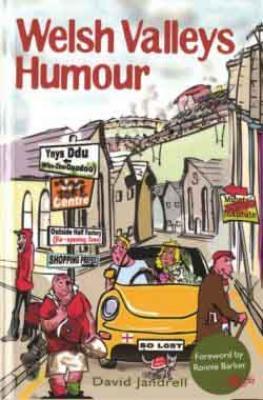 I was at a loss to think of a topic to write about, initially, to complement a list of malapropisms which was, really, the theme of the book. I decided to write about life in a south east Wales valley –demography, attitudes, personalities and the language we used. Strangely, there were no references at all to valleys language in the manuscript because I and the people who had contributed to the compilation of malapropisms all spoke the same version of non-standard valleys English so nobody had ever highlighted it to such an extent that it warranted inclusion into the ‘Silly Sayings Book’.
I was at a loss to think of a topic to write about, initially, to complement a list of malapropisms which was, really, the theme of the book. I decided to write about life in a south east Wales valley –demography, attitudes, personalities and the language we used. Strangely, there were no references at all to valleys language in the manuscript because I and the people who had contributed to the compilation of malapropisms all spoke the same version of non-standard valleys English so nobody had ever highlighted it to such an extent that it warranted inclusion into the ‘Silly Sayings Book’.
I constructed about as much as I could bring to mind on the language (which I called ‘Valleyspeak’ as a working title) and then penned some jokes with a strong Welsh slant. I checked the word count and revisited the original manuscript and copied and pasted just over two and a half pages (randomly selected) into the Valleyspeak book. This brought the word count up to the required number and I emailed it as it was to Lefi with questions such as: Do you like the style, am I producing what you expected, shall I change direction, are there any bits to be omitted and would you like me to enlarge on any sections? Two days later Lefi emailed back with a simple: “We’ll publish as it is.”
I was dumbfounded. Suddenly, I was an author. I’d heard of the trials and tribulations that prospective authors go through, years and years of submissions and rejections – and there’s me, accepted straight away following a tentative submission of my first real attempt at a structured piece of work which contained less than 1% of the material that was originally supposed to be the theme of the book. I calculated that, in its entirety, it took just under 15 hours to produce the complementary text for the book. I hadn’t even proof read it! Ronnie Barker was also genuinely thrilled that I had managed it. I sent him his signed copy too!
The book was called Welsh Valleys Humour and it headed the Welsh Books Council’s bestsellers list for 7 months. It always outsells all of my other books on a yearly basis and in 2005 I won the Welsh Books Council’s Award for Best Selling non-fiction. A reader friend has told me that Welsh Valleys Humour has headed the Gwales bestsellers list every year since 2005 to 2017 for the period covering Christmas sales.
Starting the ‘What’s On In Cwmcarn’ newsletter
About 12 months before I secured the publishing contract with Y Lolfa, I bumped into a friend’s wife– my friend had been admitted to Royal Gwent Hospital with a serious illness. I asked her how he was and she said he was bored, so could I send something down to cheer him up?
I wrote a long ‘nonsense letter’ and gave it to his wife to take to the Royal Gwent and give it to him. Somewhere in the letter I said that I had been writing a newsletter entitled What’s On In Cwmcarn– I had been doing it for two weeks and so far every issue had just been a plain piece of paper with the words, “Fuck All!” written on it. One evening I was a bit bored so I decided to actually write an issue of What’s On In Cwmcarn which was a list of spoof news stories that were ‘daft’.
Feedback from the hospital was good- it was passed around the ward. The nurses and doctors read it and passed it to different wards. My friend also showed it to other friends who visited him and they contacted me and asked for a copy. The following week I wrote a follow up and sent it to the Royal Gwent with his wife and emailed the second issue to the friends who had requested the first one. I wrote an issue for the 10 weeks that he was incarcerated; when he came home I stopped writing the newsletter.
I began receiving emails from people on the mailing list saying things like: “Oi, where’s my newsletter? I haven’t had one yet this week.” I explained that I had stopped because the reason that I had started doing it had ceased – my friend was out of hospital. They insisted that that was no reason to stop producing it and persuaded me to carry on. I reluctantly agreed.
By this time I had showed a few people at the college I was working in and it was being emailed internally around most of the staff who knew me. They were then emailing it to their associates both within the college and outside. I used to email it to about a dozen people not cobbected to the college and they were also passing it on to people that they knew. I am aware that one person that was on my email list worked in a tower block in Surrey and he emailed it globally to everyone in the building (that was 3000+ people). I had a massive readership, bigger than I could have imagined.
Returning to the main story- Ronnie Barker got back in touch about a week after receiving his signed copy with feedback on the book. I was expecting him to be unhappy because I’d used so little of the material he’d seen and the final book contained mostly prose ‘knocked up’ very quickly by me! He had never seen this. He was very complimentary and told me that he hadn’t realised that I was such a talented and accomplished writer. Neither had I! Apart from scientific essays and papers it was the first non-serious stuff I’d written.
He asked me to send him something else that I had written, but I didn’t have anything apart from the What’s On In Cwmcarn newsletter so I copied and pasted some examples of past issues into a word document and posted it to him and added him to my mailing list. He absolutely loved the newsletter and he used to ring me to discuss his favourites from each week’s issues.
Once he said: “Does Cwmcarn actually exist?”
I said: “Yes, it’s where I live.”
He said: “In that case I must visit. I am fascinated by Cwmcarn and I have this mental picture of it. I have to see what it’s really like.”
Wow!
After a few weeks he asked me if I would like to submit some of the ‘stories’ from the newsletter for inclusion into the Two Ronnies end of show ‘newsdesk’ section- he even suggested which ones to submit. I agreed, obviously, and collected a few hundred stories from back issues, including the ones that he’d requested and began to compile a submission letter. The Two Ronnies had made a comeback and they had just aired what was to be their final show. They were going to make one more series and my stories, hopefully, would feature in that one.
Sadly, Ronnie Barker was visibly infirm during the filming of the last series that was aired and following that, his health deteriorated very quickly and he passed away. The official ‘last show’ never happened- and he hadn’t actually visited Cwmcarn either, which was a pity because I knew he genuinely wanted to come.
When Y Lolfa approached me for a new book I suggested that I used the bank of stories that I had supplied to Ronnie Barker. Lefi was on the mailing list for the What’s On In Cwmcarn newsletter so he was aware of the kind on material that it would contain.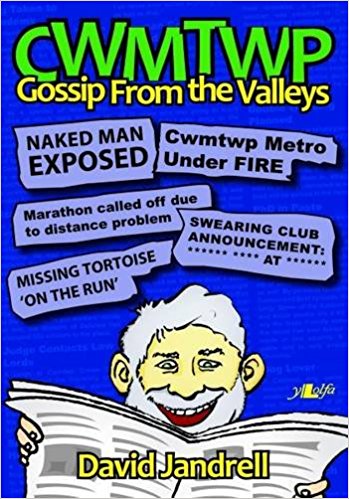
The problem, again, was how to present it because, like the ‘Silly Sayings Book’ manuscript it was a huge list of unconnected spoof news stories. After a lot of huffing and puffing, I decided to create a scenario whereby an archaeologist, way into the future, acquires an archive of the What’s On In Cwmcarn newsletter and studies it in depth.
The story involves this archaeologist trying to make sense of something that never made sense in the first place. He reads a batch of stories and then comments on what each may mean – when he has completed one batch, he moves onto the next batch, and so on. If I had to choose which of my books was my personal favourite, it would be this one. It is entitled Cwmtwp and it involved me doing a find and replace exercise on the main script and changing the word Cwmcarn to Cwmtwp- mainly because I still live in Cwmcarn.
I mentioned earlier that I was shocked at the extent of my readership for the newsletter; when I finally got fed up with writing it I decided to call it a day. The last one that I penned was entitled The Last Issue and I emailed it out to the usual suspects. After two hours of this posting, I received an email a reader in West Sussex with the message: “Well I don’t know you are but thanks for keeping us amused over the last eighteen months.”
I received close on two hundred emails over the next week or so from people hailing from the UK, USA, Canada, Norway, Spain, Australia, New Zealand, all thanking me for writing the newsletter and how much they would miss it.
Two odd stories
One of the people I emailed the newsletter to had a best friend who was the Chief Constable of Gwent Police, and my friend would forward the newsletter to him each week. One of the recurring characters in the newsletter was called Sergeant Hogg, the chief of police in Cwmcarn. I didn’t depict him very favourably – he was corrupt, uncouth and every time he made a statement, they were made from the cake shop, the chip shop, the canteen etc.
My friend told me that the actual chief of police was a huge fan of Sergeant Hogg and couldn’t wait to see what he had been up to this week? My friend also told me that when the Chief had finished the newsletter, he’d highlight the Sgt Hogg story and pin the newsletter on the central notice board at police headquarters. It seemed that all of the officers at Gwent Police who frequented Police HQ were also fans of Sergeant Hogg. I was always intrigued why they would like him- I didn’t.
One of my colleagues had a friend who was in the RAF. He told me a very sinister ‘newsletter related’ story. Apparently, his friend was in an aeroplane flying over Iraq during the Gulf War days and they were actually in the process of bombing Baghdad. I can’t remember how many my friend told me were in the plane but during the process of bombing people they were all laughing out loud because one of the airmen in the plane was reading out the latest newsletter to them from a laptop! What a sobering thought.
Current work
The original ‘Silly Sayings’ book:
